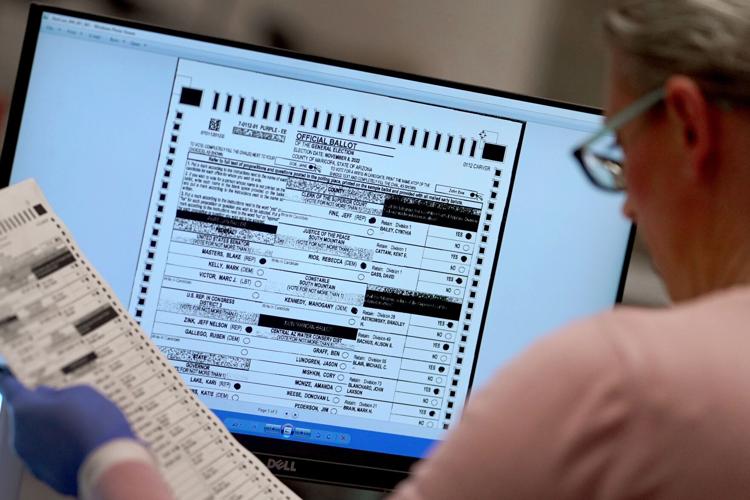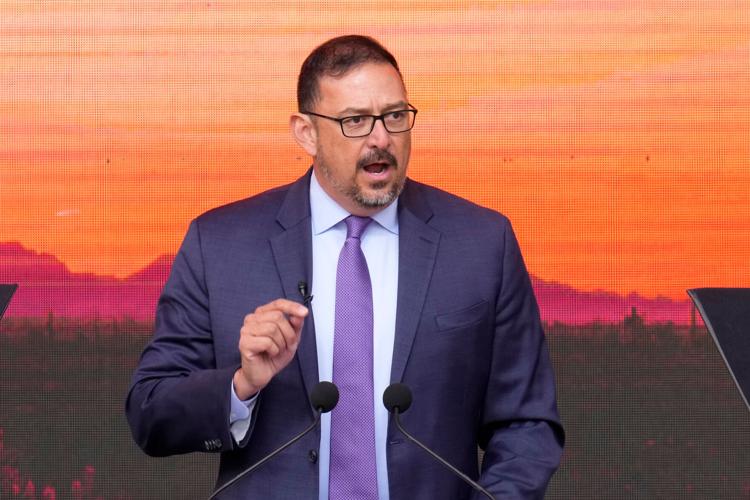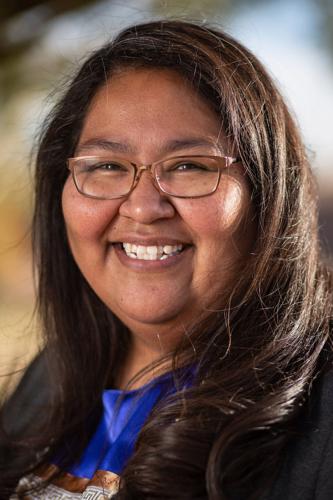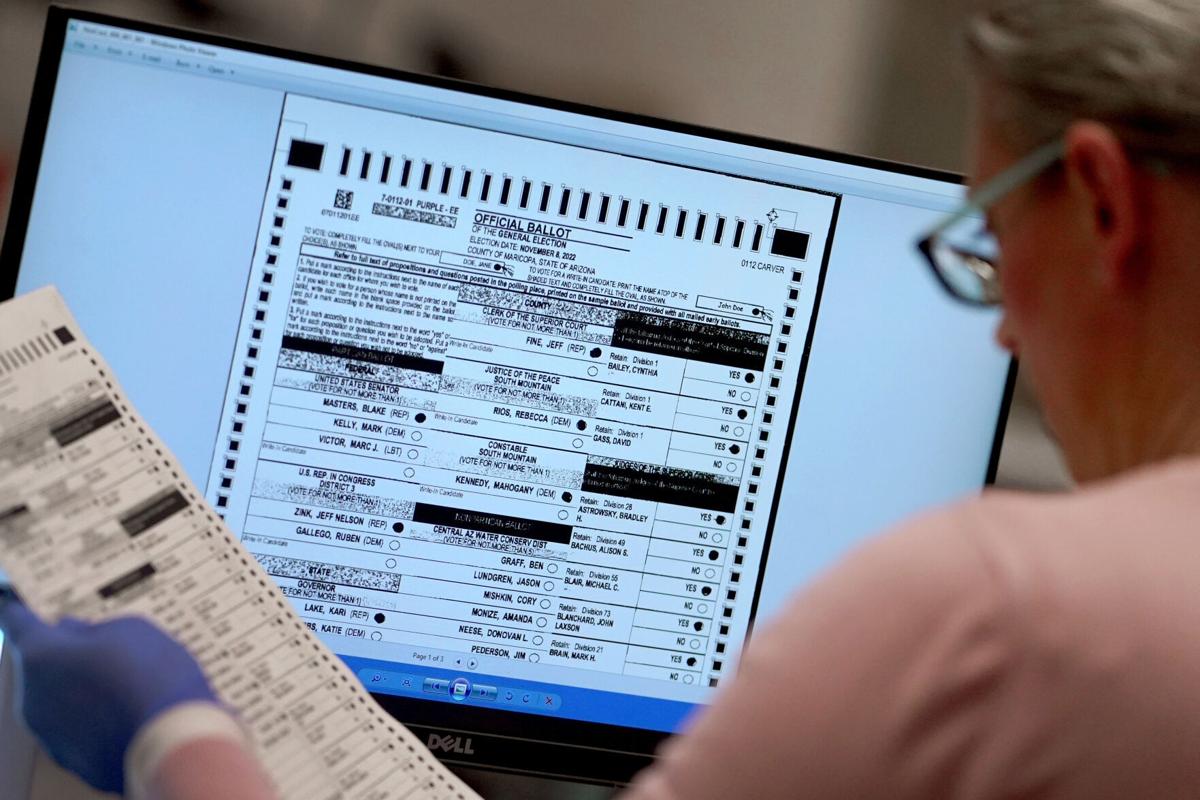PHOENIX — Republican senators advanced changes in election laws and procedures Thursday that officials who run elections said could disenfranchise some voters.
House Concurrent Resolution 2056 is billed as an effort to get final election results in a more timely fashion. It proposes to do that by requiring that ballots be counted at each polling location and restricting when and where Arizonans can drop off their early ballots if they haven’t put them in the mail.
That’s designed to avoid a process that now can take weeks, and not just because ballots have to be transported to a central counting location. Results can also be delayed because early ballots can be delivered by voters to polling places right up to 7 p.m. on Election Day and election workers must verify voters’ signatures on those envelopes.
But Democratic Secretary of State Adrian Fontes told the Senate Elections Committee there are a series of problems with the proposal. One, he said, is insufficient funding to buy tabulators that would be needed at each polling location.
Another is is less convenience for early voters, who would lose their ability to drop off their ballots at vote centers on Saturday, Sunday or Monday before the election.

Secretary of State Adrian Fontes
The measure still would allow Arizonans to bring their early ballots to polling places on Election Day. But they could not be simply dropped off, as is now the practice. Instead, the voter would have to first stand in line to present identification.
That would eliminate the need to later verify the signature on the ballot envelope. But Democratic Pima County Recorder Gabriella Cázares-Kelly said an in-person verification process would itself create long lines at the polls.
Sen. John Kavanagh, R-Fountain Hills, countered, however, that it is the current system that creates lines. He said the people who show up at the polls on Election Day with their early ballots gum up the works. The proposed change would encourage them to instead drop ballots in the mail and not wait until the last minute, he said.
The Republican-led committee approved the measure on a 4-3 party-line vote. But Sen. Ken Bennett, R-Prescott, a former secretary of state, conceded there are issues that need to be resolved before it goes to the full Senate.
“This is a work in progress,’’ he said.
The measure, written by Sen. Wendy Rogers, R-Flagstaff, would go directly to voters in November, bypassing the need to get buy-in from Democratic Gov. Katie Hobbs, herself a former secretary of state.

Gabriella Cázares-Kelly, Pima County recorder
Sen. Brian Fernandez, D-Yuma, said he doesn’t hear any calls from constituents that they want what Rogers is proposing.
“I think this is just a few people that are on the extreme that want to figure out a way to make it more difficult for people to do what they should be able to do in an easy manner, which is vote,’’ he said.
Sen. Anna Hernandez, D-Phoenix, said the measure approved by the committee was “pieced together off of conspiracy theories and people that aren’t willing to accept voter results.’’
But supporters say the measure is needed to speed up the counting process. A key piece is the proposed requirement to count ballots at local precincts or vote centers.
Fontes said seven counties already do that. But eight — Apache, Coconino, Gila, Mohave, Pima, Pinal, Santa Cruz and Yavapai — do not, shipping all the ballots to central locations to be counted.
“You’re asking all of those counties to completely shift the way that they do everything,’’ which costs money, he told lawmakers.
Consider Coconino County. He said HCR 2056 would require two tabulators at each vote center, one for people voting in person and one for those bringing in early ballots.
With 99 precincts and machines costing up to $10,000, that cost would approach $1 million. But the $11 million funding included in the measure is to be divided up proportionately by population, meaning Coconino County would get only around $230,000.
Fontes said that does not consider the extra staffing needed at each site to do tabulation, separate from the regular poll workers, plus costs for things like subscriptions for needed software.
He said there also would be new expenses for the seven counties that already do on-site tabulation, as the measure would require two tabulators at each site, one, as now, for people who vote in person and a second for early ballots.
Election officials also voiced concerns about eliminating the option for voters to simply drop off their early ballots at any voting center at any time before the end of Election Day.
HCR 2056 says the only way ballots could be dropped off and accepted after 7 p.m. the Friday before Election Day — other than in-person voting, with ID on Election Day itself — is if voters take them to the county election office. That would result in inconvenience to voters, Fontes said.
“If you live in Lake Havasu City, you’re going to have to drive to Kingman,’’ Fontes said. “If you live in Casa Grande, you’re going to have to drive all the way to Florence. And if you’re at the bottom of the Grand Canyon you’re going to have to come out of the Grand Canyon and drive to Flagstaff.’’
Rogers called concerns about how this would affect early voters who wait until the last minute “specious.’’
“There’s a whole month that someone can mail in his ballot,’’ she said.
Fontes also said the resolution’s wording, which was not made public until Monday, is filled with “ambiguities,’’ the kind he said will “generate a lot of (billable) hours’’ by attorneys who litigate election issues.
“We just respectfully believe this pie is not fully cooked,’’ he said.
“I see this as a solution asking for a problem,’’ Fontes continued. “It ain’t broke.’’
But what is broken, as far as some Republicans are concerned, is the amount of time it takes to get final election results, something Kavanagh attributes to how early ballots are now handled.
He pointed out that once an early ballot is dropped off, something that can happen even on Election Day, then it needs to be shipped to a central processing center. Even then, the envelope cannot be opened to count the votes inside until the signature on the outside is compared with others already on file with county election officials.
Meanwhile, those central locations are tallying the votes cast in person on Election Day.
Kavanagh said that becomes a problem when you have a situation like what happened in 2022. More than 290,000 residents of Maricopa County alone decided not to put their early ballots in the mail or place them in drop boxes, choosing instead to take them directly to polling places.
That left results unclear for more than a week. The delay in final tallies only added fuel to claims — some still being pursued in court challenges nearly two years later by candidates who lost the election — that there was something amiss in the process.
There are various other provisions in the legislation, including one that would bar election officials from accepting any funds from foreign entities to help administer an election.
Only thing is, Cázares-Kelly said, counties already can’t accept such help.
“It’s not a thing,’’ she said. “I think it’s an easy sell for the uninformed voter,’’ designed to attract votes for the measure in November regardless of how people feel about what else is in the package, she said.
Get your morning recap of today's local news and read the full stories here: tucne.ws/morning







